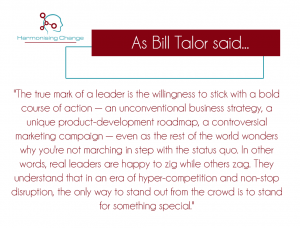
Time for Change
It’s time for change. Whether we like it or not, the world, and the way we live in it has changed.
We see people acting out against systemic change, we read about the dawn of the fourth industrial revolution and we’re standing up for what we believe in, because 2020 has levelled the playing field. It has shown us that with enough courage and determination we can play a part in transformation, and we can do it now.
Why should this be any different in the workplace?
Leadership is often defined by risk and accountability. Top tier management is responsible, and rightfully so, for ‘future proofing’ the business. They’re being paid the ‘big bucks’ to look ahead, to plan and implement strategies that are good for business. But in the midst of a global pandemic, international recessions, heightened socio-economic environments and an unstable political climate, business leaders can no longer do it alone.
 In a time when things are remarkably uncertain, leaders are searching desperately for support, for people to be courageous and become a part of building a new normal.
In a time when things are remarkably uncertain, leaders are searching desperately for support, for people to be courageous and become a part of building a new normal.

Think of a business like a city. A system of interconnected parts, each with their own functions and purpose. In order for the city to work efficiently it relies on all of the parts. If one area of the city becomes ineffective, it impacts on the whole city. Much like a business. We have leaders who are dealing with change in every single area of the business. As a first for many businesses, all of its parts now require an equal amount of attention and innovation. Each area has to find new ways of working and has to establish what that looks like within the bigger organisation.
Right now, most businesses are finding themselves in one of two situations. Either,
- Organisations are realising how archaic their strategies, processes and systems are;
- or businesses are implementing their change strategies, thinking ahead and future proofing their businesses.
Previously we discussed ways in which businesses can support employees through transformation, but it is also important to look at how employees can form an important part of this change.
- Don’t assume change is negative. Look at the bigger picture.
- Ask questions. Understand how the change strategy is roadmapped, how it benefits the business and find ways to play a role in this transformation.
- Communicate positive change amongst your colleagues. Don’t participate in negative banter, instead remain optimistic.
- Contribute to change. Speak up. Share your ideas and fresh perspective. Take on Change Navigator roles within your workplace.
We all have a role to play in shaping this new normal. It’s business (un)usual and organisations are relying on their people to build a culture of positive transformation from the inside out. As much as we hold leadership in our organisations accountable for finding new ways to adapt and survive, employees too, need to step up and become accountable for the roles they play.
Contact Harmonising Change for more information.



